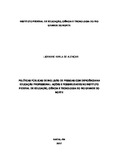Políticas públicas de inclusão de pessoas com deficiência na educação profissional: ações e possibilidades no Instituto Federal de Educação, Ciência e Tecnologia do Rio Grande do Norte

Data
2017-05-18Autor
Alencar, Ligyanne Karla de
http://lattes.cnpq.br/1058784388425443
Metadado
Mostrar registro completoResumo
This research is an analysis of inclusive education policies implemented in Brazil, with emphasis on the processes of inclusion of people with disabilities in the Professional Education at the Federal Network of Professional and Technological Education (Rede Federal de Educação Profissional e Tecnológica), focusing on the Federal Institute of Professional and Technological Education (Instituto Federal de Educação Profissional e Tecnológica). Emphasis is given to the inclusive policy under implementation at the Federal Institute of Education, Science and Technology of Rio Grande do Norte (Instituto Federal de Educação, Ciência e Tecnologia do Rio Grande do Norte - IFRN), from 2010 to 2015, with reference to the Technology, Education, Citizenship and Professionalization Action for People with Specific Needs (AçãoTecnologia, Educação, Cidadania e Profissionalização para Pessoas com Necessidades Especificas - TEC NEP), which has been developed since the year 2000, and the educational policies that are in line with it for the care of people with disabilities, such as the National Program for the Access to Technical Education and Employment Programa Nacional de Acesso ao Ensino Técnico e Emprego (PRONATEC), in the National Plan to Live Without Limits (Plano Nacional Viver Sem Limites). This is a qualitative study, based on a bibliographical survey, on legal and documental analysis and on questionnaire replies, given by 36 public servants from the campuses Santa Cruz, Caicó, Currais Novos, Parelhas, São Gonçalo do Amarante, Distance Learning (Educação à Distância), Natal Central, Macau, Natal Zona Norte, Parnamirim, João Câmara e Nova Cruz. These public servants work at the coordinations of research and extension, as well as the Center for Assistance to People with Special Needs (NAPNE), and the Academic Direction. The analysis focused on a theoretical-methodological dialogue based on the sociology of absences, since this makes possible the confrontation of inclusive possibilities even within an excluding capitalist state like the Brazilian. The subjects were questioned about the internal policies of inclusion, as far as the professional qualification of the public servants and the actions of the IFRN's training tripod in teaching, research and extension for the inclusion of people with disabilities in the institution. The data revealed that the existance of inclusive actions in teaching, extension, and research in the IFRN demonstrates the potential of this institution in truly being a center of excellence, as foreseen in the TEC NEP Action for the access, permanence and successful exit to the labour market of people with disabilities. However, the internal policy of inclusion of people with disabilities in the IFRN exists in a timid manner and needs better articulation and dissemination of their actions for all public servants and for society. We also consider that the reflections undertaken in the research can help the managers of this policy to reduce the edges that impose limits to this internal policy to make it more efficient, showing society the possibilities present in the institution, including the struggle for a system of quotas or reserves of vacancies in the selective process of access to the programs offered by the IFRN, mainly to the High School Integrated to the Professional Educaion (Ensino Médio Integrado à Educação Profissional), so that we can move towards a more inclusive society.
Keywords: Public Policies for Inclusion. Professional Education. Person with disability. Professional Education for people with disabilities.



